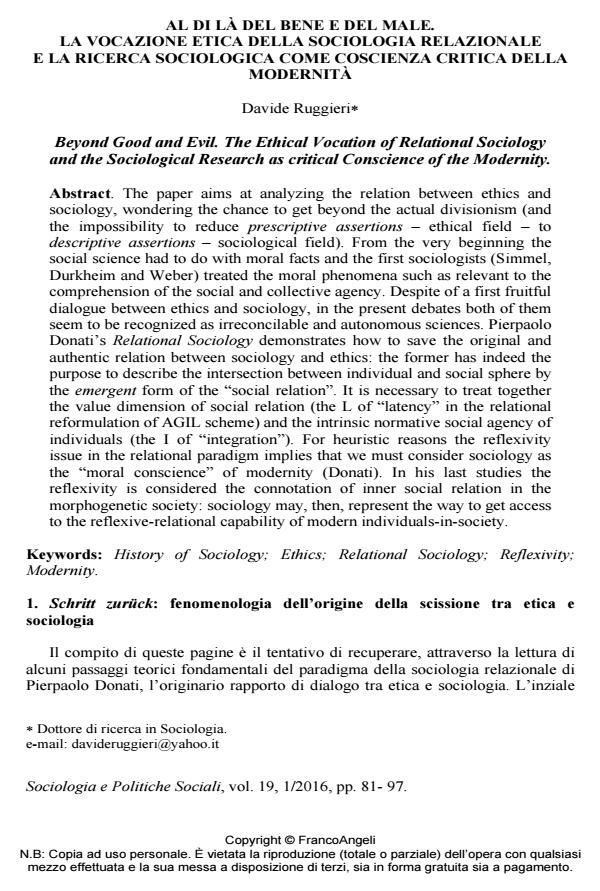Beyond Good and Evil. The Ethical Vocation of Relational Sociology and the Sociological Research as critical Conscience of the Modernity.
Journal title SOCIOLOGIA E POLITICHE SOCIALI
Author/s Davide Ruggieri
Publishing Year 2016 Issue 2016/1
Language Italian Pages 17 P. 81-97 File size 143 KB
DOI 10.3280/SP2016-001005
DOI is like a bar code for intellectual property: to have more infomation
click here
Below, you can see the article first page
If you want to buy this article in PDF format, you can do it, following the instructions to buy download credits

FrancoAngeli is member of Publishers International Linking Association, Inc (PILA), a not-for-profit association which run the CrossRef service enabling links to and from online scholarly content.
The paper aims at analyzing the relation between ethics and sociology, wondering the chance to get beyond the actual divisionism (and the impossibility to reduce prescriptive assertions - ethical field - to descriptive assertions - sociological field). From the very beginning the social science had to do with moral facts and the first sociologists (Simmel, Durkheim and Weber) treated the moral phenomena such as relevant to the comprehension of the social and collective agency. Despite of a first fruitful dialogue between ethics and sociology, in the present debates both of them seem to be recognized as irreconcilable and autonomous sciences. Pierpaolo Donati’s Relational Sociology demonstrates how to save the original and authentic relation between sociology and ethics: the former has indeed the purpose to describe the intersection between individual and social sphere by the emergent form of the "social relation". It is necessary to treat together the value dimension of social relation (the L of "latency" in the relational reformulation of AGIL scheme) and the intrinsic normative social agency of individuals (the I of "integration"). For heuristic reasons the reflexivity issue in the relational paradigm implies that we must consider sociology as the "moral conscience" of modernity (Donati). In his last studies the reflexivity is considered the connotation of inner social relation in the morphogenetic society: sociology may, then, represent the way to get access to the reflexive-relational capability of modern individuals-in-society.
Keywords: History of Sociology; Ethics; Relational Sociology; Reflexivity; Modernity
- Responsible Advanced Design: Achieving Sustainability through Collaborative Processes Laura Succini, Erik Ciravegna, Flaviano Celaschi, Veronica Pasini, in Temes de Disseny /2024 pp.92
DOI: 10.46467/TdD40.2024.92-111
Davide Ruggieri, Al di là del bene e del male. la vocazione etica della sociologia relazionale e la ricerca sociologica come coscienza critica della modernità in "SOCIOLOGIA E POLITICHE SOCIALI" 1/2016, pp 81-97, DOI: 10.3280/SP2016-001005